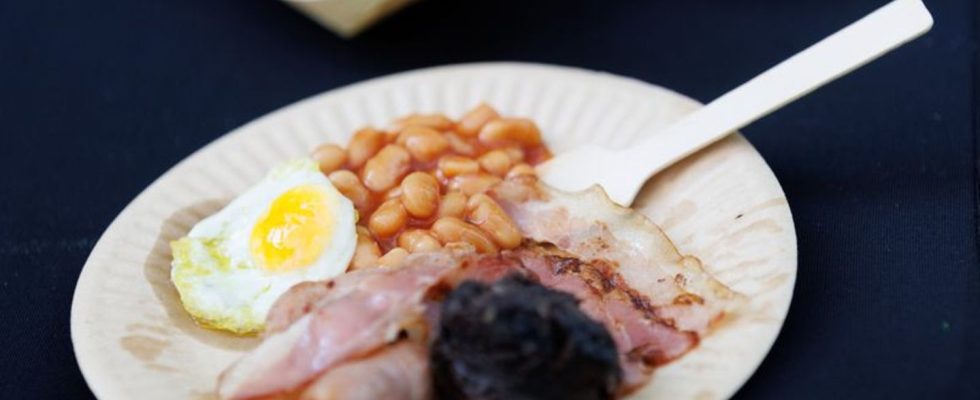Eat Drink
What makes an English breakfast
“An English breakfast is something whose ingredients come from the UK,” says Guise Bule, head of the English Breakfast Society. photo
© Eduardo Parra/Zuma Press/dpa
For many tourists, a hearty breakfast is a must in Great Britain. But too often they are presented with cheap imported goods, complain the Grail Guardians.
Hash browns? No, Guise Bule certainly wouldn’t take the fried potato cakes with his full English breakfast. Rather, you should go for Bubble and Squeak, a dish made from mashed potatoes and mashed cabbage. “The English have always had this on their plate. But someone decided it was easier to fry these reconstituted squares,” complains Bule. This only happens at McDonald’s. And he should know. Because Bule is head of the English Breakfast Society – which is celebrating English Breakfast Day this Saturday.
Bacon, sausage, baked beans, egg, maybe half a fried mushroom, of course bubble and squeak or even some black pudding, i.e. black pudding. Plus toast, of course. This is a full English that society would like. Okay, there’s usually a tomato there, but no one would like it anyway, says Bule. However, it is important to him to emphasize: “We are not dogmatic.” If you want to eat hash browns or smoked kippers, smoked herring – go ahead.
Content is ultimately secondary, and there are regional variations, which spices up the tradition. Black pudding, for example, is popular Scotland – where the breakfast is of course listed as Scottish Breakfast – or served in Northern England.
Tourists attracted with cheap breakfast
No, society cares about origins. “An English breakfast is something whose ingredients come from the United Kingdom,” says Bule in an interview with the German Press Agency. When he is outraged that in recent years many cafés and restaurants have lured tourists with cheap breakfasts and sold them as originals, the word “shit” is often used. So it’s not surprising when holidaymakers from Great Britain return home and complain about British cuisine.
“The new socio-economic distinction,” Bule calls it. Here the cheap “fry-up”, which means nothing and comes from imported junk – and there the real English breakfast made from traditional ingredients such as sausages from Cumberland or Lincolnshire. “This is a traditional meal that should be served with pride, using ingredients sourced from the British Isles,” says the society boss.
He is pleased that the future of an ingredient that is definitely in jeopardy could be secured: baked beans. As the BBC recently reported, white beans (haricots) grown in Great Britain were successfully used for the dish baked in tomato sauce for the first time. More than two million cans of baked beans are eaten every day in Great Britain, the beans come from the USA, Canada, Ethiopia and China. It will probably take some time before the British beans reach supermarkets. But farmer Andrew Ward already spoke of an “absolute milestone”. “The fact that we’re able to produce something in such large quantities that we consume in such large quantities in this country is just incredible.”
Changes throughout history
The breakfast tradition is ancient. Centuries ago, rich Anglo-Saxons used their cuisine and hunting success to impress friends and enemies. The emphasis on English also came about because of the Norman invasion, the invaders brought with them new words and new foods. Later, the nouveau riche adopted the tradition, and as the Industrial Revolution put more money into their pockets, more and more people were able to afford a decent breakfast.
It was only at the beginning of the 20th century that the English breakfast emerged in its current, standardized form, which was now offered in a very similar and recognizable way in bed and breakfasts, hotels, cafés and trains. Then you knew what you had. In the early 1950s, around half of Brits started their day with a full English. That has long since changed. Those who work at a desk prefer to avoid the huge amount of calories. That’s why, for many people, the big British breakfast is something for the weekend. For society boss Bule it’s only logical: “The best English breakfast is at home,” he says and laughs.

